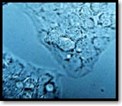Liver Culture for HBV Virus Developed by Amphioxus

The announcement was made by Norman L. Sussman, executive vice president of ACT, at the 10th International Symposium on Viral Hepatitis and Liver Disease in Atlanta. According to Sussman, an obstacle to developing effective drugs against HBV has been the inability to grow the virus outside the human body. While several other cell culture systems and animal models have been used to study the virus, none reproduces the actual infectious life cycle of HBV.
"Our culture system will allow our scientists to study the virus life cycle in great detail, enabling them to design better anti-viral agents and devise new methods to prevent spread of the disease," Sussman said. "In addition, our cells mimic the response of the human liver to toxic compounds, so drugs developed using our system can be both safe and effective. We see that as a real advantage because many candidate anti-viral drugs have toxicity problems," he said.
 The Amphioxus cell line, called C3A (the name Amphioxus, by the way, refers to the first organism with a defined liver), simulates normal human liver responses to stimuli, including drugs and hormones. Specialized culture conditions had to be found that would allow the cell line to support HBV replication. Once this was done, serum from infected patients was added to the cultures, and virus growth was demonstrated by two techniques: polymerase chain reaction (PCR) and by direct staining the C3A cells for viral proteins.
The Amphioxus cell line, called C3A (the name Amphioxus, by the way, refers to the first organism with a defined liver), simulates normal human liver responses to stimuli, including drugs and hormones. Specialized culture conditions had to be found that would allow the cell line to support HBV replication. Once this was done, serum from infected patients was added to the cultures, and virus growth was demonstrated by two techniques: polymerase chain reaction (PCR) and by direct staining the C3A cells for viral proteins.
"The ability to infect cells with natural virus is crucial to development of new strategies to limit spread of the disease," said James H. Kelly, president of ACT. "Our system will allow us to understand how HBV enters the liver cell and begins its replicative cycle. With this information in hand, we should be able to intervene in this process in a useful way," he said.
Pharmaceutical companies can spend upwards of $400 million to bring a new drug to market. Sussman and Kelly expect their cell culture system will help get effective drugs on the market faster and less expensively. They are currently establishing partnerships with a number of pharmaceutical companies that share an interest in anti-viral agents.
The company is also taking a similar approach to growing the hepatitis C virus (HCV), which affects nearly 4 million people in the United States and has been similarly difficult to grow in culture.
Amphioxus Cell Technologies Inc., founded in 1995, specializes in culturing human liver cell lines for use in drug discovery, toxicology, plasma protein production, and artificial liver support.
For more information: James H. Kelly, President, Amphioxus Cell Technologies Inc., 11222 Richmond Ave., Suite 180, Houston, TX 77082-2646. Tel: 281-679-7900. Fax: 281-679-7910.
